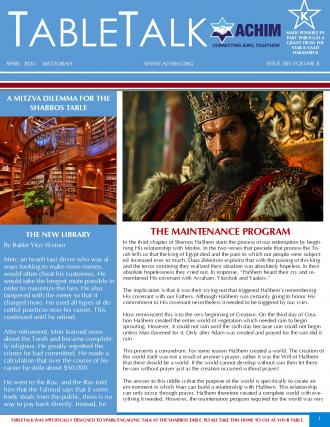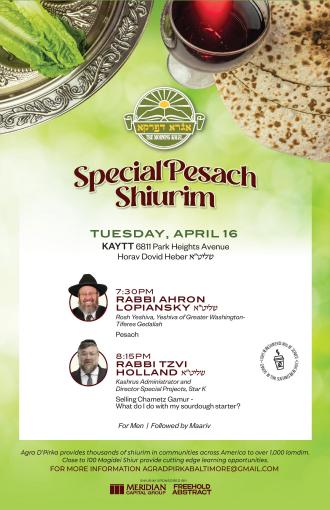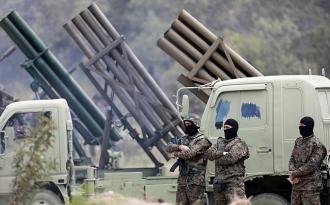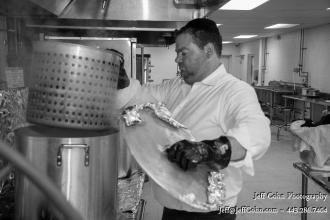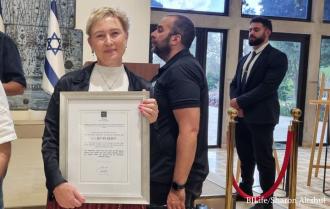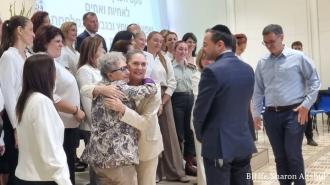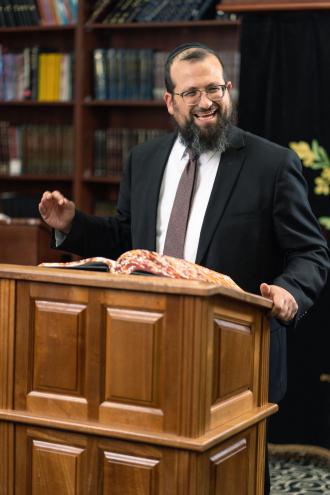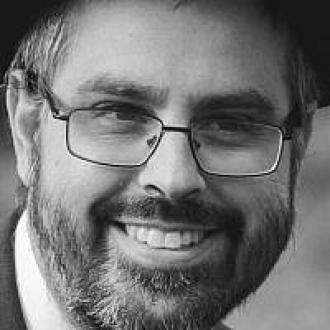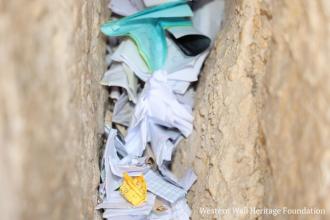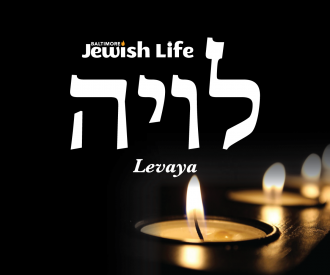The parting pesukim of last weeks parsha at the end of Ki Savo are very striking: Hashem has not given Klal Yisroel the capacity to understand what was happening to them for forty years—until this day. What was so special about this day? Rashi explains that this was the day Moshe Rabbeinu completed writing the sefer Torah and handed it over specifically to Shevet Levi. Upon seeing this, Klal Yisroel protested and demanded that they also get a sefer Torah and not be forced to rely on Shevet Levi’s custodianship. When hearing this response, Moshe remarks that now you have become a nation.
The Meshech Chochmoh ties this incident into the running theme of all these parshiyos. This was the critical day of Moshe Rabbeinu’s death and he was giving his last instructions to Klal Yisroel. Up till this time, Klal Yisroel were not living a normal natural life. They lived surrounded by constant open miracles. But who was responsible for these miracles? Hashem wanted them to realize what the Ramban says at the end of Parshas Bo. When we see open miracles which break the laws of nature, we come to understand that the laws of nature are not absolute. They have no independent power over our lives. Hashem is in total control of everything that happens-- even if they seem to be happening naturally. Natural law is ultimately a string of hidden miracles--an illusion which hides the true reality.
But Klal Yisroel didn’t internalize this message while they were living through it. They were misled by Moshe Rabbeinu’s abilities and they thought Moshe was some superhuman and had divine powers providing for them and sustaining them in the Wilderness. Moshe now informs Klal Yisroel that he is mortal after all. He is nothing but Hashem’s messenger and now his job is complete and he will die. He is telling Klal Yisroel that this period of supernatural existence is coming to a close. He is preparing them for the next phase of their history so they understand clearly that the natural world of cause and effect runs under Hashem’s hashgocho as well - no less than when they lived supernaturally. So even though they are now fighting battles and gathering spoils of war, there is still tremendous, ongoing, hands-on hashgocho which allows them to achieve incredible success within the natural world. But it depends on your level. When Klal Yisroel are at the highest level, everything in the natural world gave them blessing and bounty with no struggle. The more we bring Hashem into the world, the more nature responds to our benefit. The more we draw away from Hashem and He is absent from the world, then nature becomes violent and destructive and starts to endanger us. It depends on our spiritual level.
There was a time in our history where sick people first went to a Novi to find out what spiritual blocks and faults were hampering their body functions. The Novi told them what they had to work on in ruchniyus to heal themselves. At that time of nevuoh and ruach hakodesh there was visible, tangible correspondence between the spiritual world and the physical world. People could see that interconnection. When we lost that level and lost that tangible hashroas haschechinoh in our midst, the world now seems to be running according to mechanistic rules and laws. Even though we still don’t know all the physical causes for many things in the physical world, like certain medical problems and rainfall, and those keys are still in Hashem’s hands, the impression we get is that some physical cause must be controlling it.
This is what the Ramban explains in Parshas Bechukosai. In the period of the final geuloh, the connection between Hashem and Klal Yisroel will be so close that all of nature will be in harmony and there will be no tension and strife. The spiritual world and physical world come to a point of complete, open correspondence. This is what the Meshech Chochmoh writes about Parshas Ki Savo. Moshe Rabbeinu is teaching Klal Yisroel that one cannot fool himself to think the spiritual and physical worlds do not affect each other. On the contrary, one’s spiritual level is what determines our situation in the physical world—through the cheshbon of reward and punishment.
The Rambam in Moreh Nevuchim says every physical event that happens to a human being is a result of Hashem’s infinite cheshbon of reward and punishment. The psukim in Bechukosai tell us what happens when our level rises to a high level--all of nature gives blessing and bounty. And Parhsas Nitzovim tells us after all the terrible things that will occur to Klal Yisroel when we are sent into golus, we will finally come to the realization of why disaster happens and we will begin to do teshuvoh. The more we respond to Hashem’s messages, the closer Hashem comes to us and we bring Hashem more completely into the world.
Hashem will remove the orloh of the heart. What is this? It is insensitivity to the messages Hashem sends us. We think the events of the world are determined by blind, natural historical forces. We don’t recognize the constant hashgocho in our day-to-day lives. We have a scientific mindset towards the world. But the more we return to Hashem, the more He will sensitize us to the reality of Hashem’s active role in running this world. He will remove the orloh of our hearts.
What is our job? The pesukim refer to a specific mitzvah that is not in Heaven and is not across the sea. It is in our mouths and in our hearts to fulfill it. This mitzvah is the key to doing teshuvoh and turning things around and realizing what Hashem’s message is. Which mitzvah is this?
Rashi says this mitzvah is limud HaTorah. It is not in Heaven or across the sea; if it was, we would still have to make the effort to get it. But in reality, it is already in your heart. There is nothing that presents a person from using his free will to open himself up to the messages of the Torah and make it a part of him.
In next week’s parsha, we have an interesting series of pesukim. It predicts that after we will endure many disasters, we will seek the true cause of our misfortunes and we will conclude that it was because we didn’t let Hashem into our lives. We forsook Him and He forsook us in response. We finally wake ourselves up to make the initial steps to teshuvah, but immediately the pesukim say that hester ponim continues and even intensifies! Why? The Ramban explains that just having the realization that we need to do teshuvoh but not taking any concrete steps to improve and make the necessary changes in my daily life, is very dangerous.
The beginning of Sefer Yechezkel introduces the vision of the Merkovo which takes place in the 30th year. 30 years from when? The meforshim explain that it was 30 years from the time of King Yoshiyahu who tried to turn Klal Yisroel around from their spiritual decline. He almost succeeded, but ultimately failed. All his gains fizzled out, and because of that, the 30 year countdown to the churbon began.
We have to look at ourselves. Over the past 100 years, Jewish history has been a fulfillment of all the tragedies of the tochocho. Because of this, we have to wake up and realize what the root causes are –and act to fix them. The message of the tochocho is that Hashem has retreated from the world and allowed all the calamities to befall us because we threw Him out of our lives. But that is only step one. Step two is actively working to bring Hashem back into our lives. And according to Rashi, the posuk tells us that we do this through limud HaTorah. Because immediately afterwards we have a mitzvah to write a sefer Torah.
But interestingly enough, the Torah refers to itself as a shiroh. Why? Because there are times where limud haTorah becomes a song that our neshomo sings out to Hashem. When we recognize the capacity that limud haTorah has to connect us to Hashem Himself, our limud haTorah becomes a song of the neshomo which expresses that deep, intimate connection.
We are living at a crossroads in human history. The Second World War irrevocably changed the face of Jewish society. When one takes a snapshot of the Jewish world in 1938 and then again in 1948, you see two completely different realities. From that period onward things seemed to have stabilized and maintained a steady equilibrium. But over the past 10-15 years, chaos and instability has been suddenly re-introduced to the world. The rise of Muslim influence and ideology, and its grip on the world economy and our eroded sense of security is something no-one would have predicted 15 years ago. Again, we are living in a radically changing world which has gone absolutely mad.
The posuk has told us that Hashem is running the world—nothing is by accident. He sometimes acts above natural law and sometimes through natural law. War and peace, recession or prosperity in the coming year is going to be decided in a few days when Hashem sits in judgment upon the world. He is running it. When we stop realizing this and we see tragedies that have happened or might happen, our response has to be to get Hashem back into our lives and realize once again why things are happening to us. Hashem has a very simple calculus for how he runs the world—it’s all in these parshiyos. It directly depends on our level of ruchniyus and how much we recognize His presence in our lives. The posuk tells us that when disaster threatens us, we go straight to the Torah and we will find all the answers we seek within that incredible shiroh.
Hashem promised us that this shiroh of the Torah will never be forgotten from our people. And we see how this prediction has been fulfilled against the greatest odds--for the past 2500 years, from churbon bayis rishon, through all our exiles and persecutions and upheavals. We are still with the Torah and the Torah is still our guide to understanding the world and the source of our inspiration.
So when we prepare for the Yom Hadin, when we desperately need to get Hashem’s presence back in our lives, part of that serious preparation is using limud haTorah to connect to Hashem of the deepest levels, in every aspect of life, and allow the overwhelming brocho to flow back into the world as Hashem originally intended.




